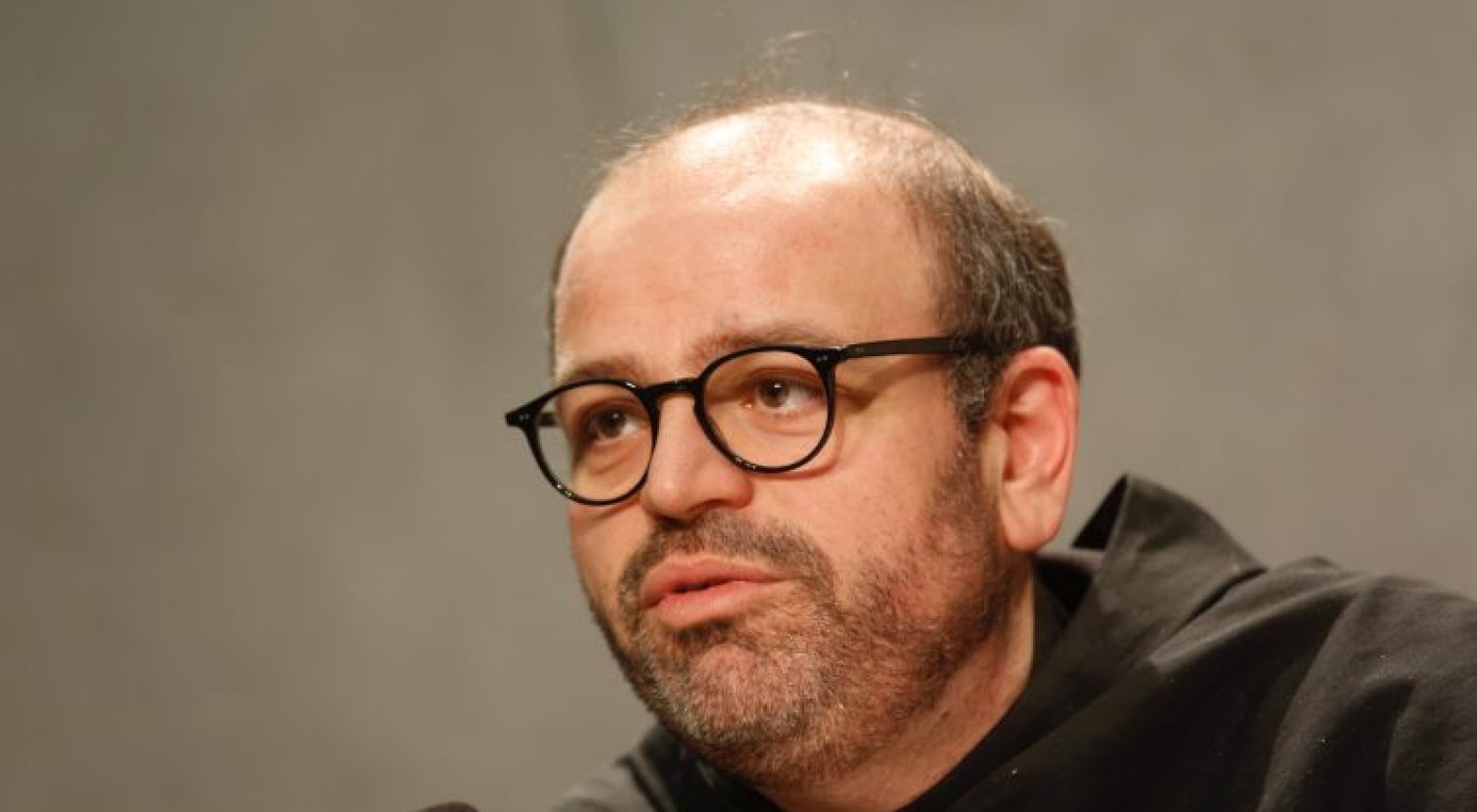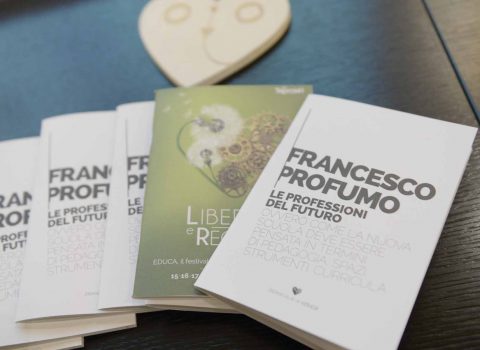“Artificial intelligence changes the way we do all things”
Interview with the expert in technology ethics Paolo Benanti
This said Professor Paolo Benanti, Franciscan friar of the Third Order Regular, who was the protagonist of the Junemeeting of Essent*IA, a series of events organized by the FBK for Health program, entitled Digital Age: epistemology and anthropology in the age of artificial intelligence at Fondazione Bruno Kessler.
Paolo Benanti travels the world to talk about ethical issues in artificial intelligence; he deals with ethics, bioethics and ethics of technologies, studies innovation management, between the internet and the impact of the Digital Age, explores biotechnology for human improvement and biosecurity, neuroscience and neurotechnology issues. Since 2008, he has been a lecturer at the Pontifical Gregorian University, where he also obtained a doctorate in moral theology, at the Theological Institute of Assisi and the Pontifical Leonian College in Anagni. We took the opportunity of the Essent* IA seminar to gather, through this video interview, some reflections and stimuli on one of the most debated topics in recent years.
Some of the questions we asked him tell us about his training and his work, others investigate his approach and his vision on the subject of technology ethics. We asked him what distinguishes him from other scholars: why does a friar talk about the ethics of technologies? What is his vision and what is the importance it gives to ethics? “I have a technical background: after high school I studied engineering for some time” – Benanti explained. “Then, at some point, I made a different life choice that led me to deal with theological and humanistic disciplines. When it came to choosing a doctorate, I tried to bring these two souls together, and I was welcomed by Georgetown University in Washington (USA) where I was able to explore first-hand biotechnology, man, digital technologies”.
“My contribution as a professor for the understanding of the human being is about putting oneself at the limit, or rather, acting as an interface between the human being and the ethical question machine”.
“The machine must respect issues that are essential for us” – Benanti goes on. “I always make this example: how should an autonomous vehicle choose, if at an intersection finds itself in the unfortunate circumstance of having to decide who to sacrifice? Who among us, when having a medical visit, has not experienced having a different diagnosis or a different treatment plan from the one we would have had from another doctor? Is one right and one wrong? Not necessarily, as with a right and a wrong one, somebody would be guilty and somebody innocent. There is a large area within the human choice”- Paolo Benanti explians – “in which different solutions seem to implement the good that we understand and that we can achieve in that moment. In fact, the best-selling car in the automotive market is Tesla, which has autopilot functions. And now peole, especially at Tesla, are asking themselves: who would be willing to spend 130 thousand euros for a car that, in the event of an accident, could choose to sacrifice those who bought it rather than strangers on the street? The problem is not an ethical reflection, but the preferences agreed on the basis of the economic values at stake. Germany said that the life of the passenger and the owner of the car is as valuable as that of the pedestrian. In the United States, the matter is not that clear. We have not responded yet”.
“The ethical choice, which is typically human” – Benanti urges – “to some extent must become a competence of the autonomous machine. To do this, I suggest a definition that is a mixture of ethics and machine, a new chapter of ethics:
“Algor-Ethics is the idea of being able to develop algorithmic tools to manage ethically sensitive dimensions of the machine equipped with artificial intelligence”.
We then pressed him on the existence of an ethics that can be shared globally: “We are used to thinking of ethics as a regulatory dimension” – Benanti replied. “The ethics of virtues is a model that globally finds much higher acceptance than a regulatory ethics. Then we can ask ourselves how fair it is, what is justice and what is fairness – a question that is largely found in the philosophy, for example, of the twentieth century. Should the car be fair, or should it not? It is an open debate”.
Professor Benanti remains optimistic about the fact that big players, big transnational companies that invest billions of dollars and resources pursue business objectives, remain centered on the good of mankind. “We are in a very particular phase of technological innovation, in which there are very big players, with balance sheets and capitalizations even higher than many states. But these large groups are made up of people where, if they do not find satisfaction in what they do, if they do not share the idea of a mission to make “the world a better place”, all this does not work. This gives rise to a juncture in which the ethical message becomes increasingly relevant. If before to this question they answered “we do business”, now they answer that ethics is an essential issue”- Benanti added.
“Keeping the debate on ethics alive is what we need so that ethics at least knocks on the doors of institutions and big players. If someone opens them, then we’ll see .. “
We reserved a question to the institutions or stakeholders with whom the Holy See is collaborating to spread the discussion on ethics. “Since the industrial revolution, the Holy See has seen itself being questioned with urgency by that new band of injustice that came with workers and with the whole social question. Therefore, at the end of the 19th century – later than other movements – a current called the Social Doctrine of the Church was born which is attentive to these changes in society. Today, it seems to be facing a new chapter in which to say something new”.
“Artificial intelligence is not a technology that helps do something specific, but it changes the way we do all things.”
We are at the beginning of this collective reflection, and it has not yet led to the Church expressing its view. Pope Francis has not yet offered an encyclical on these issues either”- Benanti added.
There is the possibility of applying guidelines, shared indications for the development of new technologies, and therefore, if it were possible to reach recognized guidelines, agreed internationally, who, which body or institution could propose itself as a supervisory body that could take responsibility for making sure that they are being enforced?
“Ethical issues must belong to a social pact and for a democratic system to work, someone needs to watch over the social pact”.
“The idea of simply launching petitions, be they regulatory or ethical, and thinking that these will happen doesn’t work” – Benanti said. “There is a need for a civil conscience, there is a need for attention that becomes a practice also for companies” the professor concluded.
The last question concerned his future commitments.
Watch the interview to find out more.
NOTE: The aim of the Essent*IA seminars is to help reflect on the needs for innovation and the role of digital technologies for health, through a humanities-led multidisciplinary approach and which see artificial intelligence – AI as the fil rouge of the series, as the utmost expression of technology support in healthcare
Paolo Benanti
FFranciscan friar of the Third Order Regular, he deals with ethics, bioethics and ethics of technologies. In particular, his studies focus on innovation management: the internet and the impact of the Digital Age, biotechnologies for human improvement and biosecurity, neuroscience and neurotechnology. Since 2008, he has been a lecturer at the Pontifical Gregorian University, where he also obtained a doctorate in moral theology, at the Theological Institute of Assisi and the Pontifical Leonian College in Anagni. In addition to the institutional courses of sexual morality and bioethics, he deals with neuroethics, technology ethics, artificial and post-human intelligence. He was part of the Artificial Intelligence Task Force to assist the Italian Agency for Digital Technology. He is a corresponding member of the Pontifical Academy for Life with a particular mandate for the world of artificial intelligences. At the end of 2018, he was selected by the Ministry of Economic Development as a member of the group of thirty experts who have the task of preparing the national strategy on artificial intelligence and the national strategy on technologies based on shared ledgers and blockchain. In November 2019, Pope Francis appointed him Consultor of the Pontifical Council for Culture. In April 2020, he published a short piece entitled: “If man is not enough. Hopes and fears in the use of technology against Covid-19 “, where he addresses the need to think how and what to do to get out of the present and still be human in the future.


